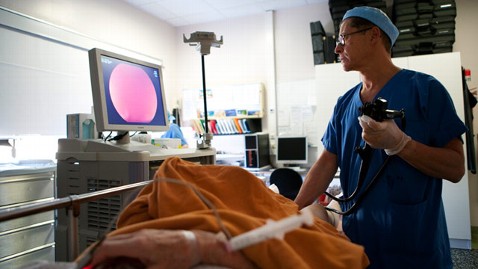Over 50? Join the 'Colonoscopy Club'

A colonoscopy can spot problems early. (Image credit: BSIP/UIG via Getty Images)
When I moved to New Jersey from Atlanta three years ago, one of the biggest challenges was finding a doctor I could connect with. I did the things I tell friends to do: I asked for recommendations; I cross-referenced with my insurer; and I checked credentials online. I picked a doctor and scheduled an appointment.
I was about to turn 51, and I wanted a referral for a colonoscopy. As a public health doctor, I know that age 50 means it is time to enter the "colonoscopy club." How could I let an entire year go by without getting screened for colon cancer? Simple: Who wants to go out of their way to endure the infamously awkward screening test, not to mention prepare for it? But it was time.
I met my new doctor in his office, and he reviewed the lengthy medical history form I had completed.
"Looks like you are in pretty good health," he said.
"Yes," I replied. "I eat a very healthy diet, exercise regularly, and have the good fortune to have no medical problems in my family."
" OK, do you take a baby aspirin?" he asked, alluding to the drug's benefits for people at risk for heart disease. "I think that would be a good idea now that you are 50."
"No," I said, explaining that I had no risk factors. "I'd be more concerned about side effects from the aspirin."
"Well, I think it would be a good idea," he replied. "What about a multivitamin? Do you take one of those?"
"No, I don't. I get my vitamins through the food I eat. My wife is a terrific cook. She writes cookbooks. We eat a diet full of fresh fruits and vegetables," I countered.
"I don't think a multivitamin would hurt. It's good to take just in case," he said, quickly segueing into a list of screening tests he wanted to order, including an electrocardiogram for my healthy heart and a PSA test, which measures a biomarker loosely tied to prostate cancer. This was not going well at all!
I explained to him why I didn't want an ECG - one of the most overused and misinterpreted screening procedures in medicine - or a PSA test, which according to the U.S. Preventive Services Task Force causes more harm than good. It was clear that we were not on the same page, and I had yet to secure my referral for my colon cancer screening - the one test I actually wanted.
I made a hasty retreat and spent some time finding a doctor who was more in line with my approach to health. She and I spent a lot of time talking; she gave me a physical exam, and gave me the slip of paper I was looking for: a referral for a colonoscopy. One week before I turned 51, I had the test and was given a clean bill of health. But not everyone is so lucky.
More than 140,000 men and women will be diagnosed with cancer of the colon or rectum in 2013, according to the American Cancer Society. And 50,000 Americans will die from the disease. The Centers for Disease Control and Prevention estimates that six out of 10 deaths from colon cancer could be prevented if everyone over 50 was screened, yet one in three adults in this category fails to follow the recommended screening guidelines.
To Prevent Colon Cancer, Get Your Butt to the Doctor
Let's face it: No one likes to get screened for colon cancer. It's a bit unpleasant, and embarrassing to talk about. But it's colon cancer awareness month, so take this to heart: Don't die from embarrassment. Do it for those who you love and those who depend on you. And keep in mind that a colonoscopy isn't your only option: There's also sigmoidoscopy, which only examines the bottom of the colon; and a test for blood hidden in the stool.
There is some debate surrounding the best approach to colorectal cancer screening, but you and your doctor can make the choice that's right for you. My bottom line comes from something said during my weekly Twitter chat, #abcDrBchat: The best colorectal screening test is the one that gets done.
"Tell Me the Truth, Doctor" is a weekly column written by ABC News' chief health and medical editor Dr. Richard Besser. Look for Dr. Besser's book April 23.
